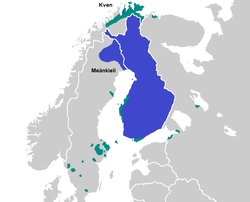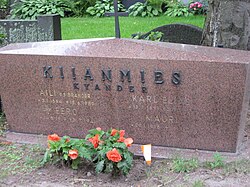
Finnish surnames are surnames used by Finnish people both in Finland proper and the Finnish Diaspora, inherited patrilineally or matrilineally. Finnish surnames come from three dissimilar traditions that were consolidated only in the early 20th century, when the first national act on names came into force in 1921, which made surnames mandatory.[1] On 1 January 2019, new Law on Given anes and Surnames came into force, which standardized the surnames comventions used in most Western countries.[2]
Finland has three predominant surname traditions: the West Finnish, the East Finnish, and the tradition associated with the Swedish nobility, clergy, bourgeoisie, and military.
West Finnish surnames

Until the early 20th century, Finland was a mostly agrarian society. The names of West Finns were based on their association with a particular area, farm, or homestead: for example, Jaakko Jussila 'Jaakko from the place of Jussi'. Farm names typically had the suffix -la, -lä ("place of") and could refer to the husband (like Jussila) or describe the location, like Isoaho ("large clearing"). Until the end of the 19th century, people in Western Finland were known not only by their first name but also by a patronymic. For example, Mikko and Margareta, children of Juho, would be called Mikko Juhonpoika and Margareta Juhontyttör. Patronymics were written in church books in Swedish (for example, Johansson), but on the street, people would refer to the Finnish form Juhonpojasta, “son of Juho.” Illegitimate children would be referred to by a matronymic, such as Kaisanpoika or Kamattayttö. In addition to the patronymic and matronymic, the name of a person’s place of residence may be indicated in a surname. This Western Finnish practice was very similar to the Swedish practice, but it was less common in East Finland.
When surnames became common in Western Finland as well, the name selection guidelines suggested basing them on the name of a farm or dwelling, even if the person did not own the farm, and priests and teachers who gave surnames to the people favored the names that were already available. The alternatives in the place names were -sto derivatives (e.g. Koivisto, from “koivu,” which means “birch tree,” and -sto, together meaning “place of birch trees” or birch forest) and compound names (e.g. Myllymäki, from “mylly” meaning “mill” and “mäki” meaning “hill”). Among the most common surnames derived from place names are:
East Finnish surnames
The East Finnish surname tradition dates back to the 13th century. The Savonians pursued slash-and-burn agriculture which necessitated moving several times during a person's lifetime. This in turn required the families to have surnames, which were in wide use among the common folk as early as the 13th century. By the mid-16th century, the East Finnish surnames had become hereditary. Typically, the oldest East Finnish surnames were formed from the first names of the patriarchs of the families (e.g. Ikävalko, Termonen, Pentikäinen). In the 16th, 17th and 18th centuries, new names were most often formed by adding the place name of the former or current place of residence (e.g., Puumalainen, "of Puumala"). In the East Finnish tradition, women carried the family name of their fathers in the feminine form indicated by the -tar suffix (e.g. Puumalatar < Puumalainen). By the 19th century, this practice fell into disuse due to the influence of Western European surname tradition. Also, women did not change their surnames with marriage. Some of the most common Finnish surnames are old Eastern Finnish names:
- Korhonen (no known meaning)
- Hämäläinen (a person from the Häme region)
- Heikkinen (diminutive of Henry)
In women's surnames, the suffix -(i)nen could be replaced with the suffix -tar or -tär, as in:
Swedish tradition in Finnish surnames

A third tradition of surnames was introduced into Finland by the Swedish-speaking upper and middle classes which used typical German and Swedish surnames. By custom, all Finnish-speaking people who were able to get a position of some status in urban or learned society, or were elevated into nobility, discarded their Finnish name, adopting a Swedish, German or (in the case of clergy) a Latin surname, as official positions and many trades were only open to those speaking Swedish; soldiers received a new surname automatically upon enlisting. The oldest noble surnames of Swedish origin were derived from the charges in the coat of arms and/or flag of the family, for example Svärd (Swedish: "sword"), Kurki/Kurck (Finnish: "crane") and Kirves (Finnish: "axe"). Families of German origin would use the von suffix (e.g., Von Schantz ).
Usually, military servicemen received Swedish-language surnames based on nature or military characteristics:
Finnish patronymics
While Finns did not address each other by patronymics in colloquial speech, patronymics were used in official documents until the late 19th century. However, these surnames were almost exclusive to peasant and worker families of Eastern Finland. An interesting characteristic of patronymics is that the “patronymic swarm”, the common practice of using patronymics instead of surnames, was widely extended, as in the example below:
- Mickel Johansson
- Johan Mickelsson
- Carl Johansson
- Johan Carlsson
- Mickel Johansson
Finnicization of surnames

During the era of National Romanticism in Finland, many people finnicized their previously Swedish family names. Some of these people were descended from Finns who had previously changed their Finnish names to Swedish ones after climbing society's ladder. The climax of this stage of Finnish history was the centenary of the birth of Johan Vilhelm Snellman, the chief initiator of Finnish nationalism.[3] The author Johannes Linnankoski encouraged Finns to give up their Swedish names on 12 May, Snellman's birthday; as a consequence, between 1906 and 1907 about 70,000 Finns changed their names to Finnish-sounding ones. It was common to add the suffix -nen to a word related to nature. The nature term was often chosen according to the geographical characteristics of the place where the family lived.
Today, more than a third of Finns have last names that end with -nen. Although this Finnish suffix is usually diminutive, in surnames, it more often signifies belonging to a place of residence. So for example, the name Virtanen can literally mean “small creek,” but as a last name, it means the family lived near a creek. Mäkinen, literally “little hill,” would indicate that a family came from the top of the hill.
The five most common surnames are:
- Virtanen (“creek”)
- Mäkinen (“hill”)
- Nieminen (“cape” or “peninsula”)
- Koskinen (“rapids”)
- Järvinen (“lake”)
Later, other surnames based on nature became popular. For example:
Finnish surnames today
In 21st-century Finland, the use of surnames follows the German model; with surnames being mandatory. When marrying, a Finnish couple may adopt a shared surname, either one partner's surname or a combination of their surnames. They may also retain their surnames, take one of their spouse's surnames and either can combine their surname with that of their spouse. In case the couple takes a shared surname upon marriage, that will be the surname of their children. Otherwise, their children can get either parent's surname or a double surname combining those of their parents. From 1929 to 1985 a wife had to take the husband's surname or a double name.[4] It is also customary that siblings receive the same surname.
Most common Finnish surnames
The 10 most common surnames in Finland (April 2023)[5]:
| # | Surname | Etymology | Bearers |
|---|---|---|---|
| 1 | Korhonen | korho, "deaf" or "proud" | 22,385 |
| 2 | Virtanen | virta, "stream" | 21,606 |
| 3 | Mäkinen | mäki, "hill" | 19,963 |
| 4 | Nieminen | niemi, "cape" | 19,778 |
| 5 | Mäkelä | mäki, "hill" | 18,945 |
| 6 | Hämäläinen | Häme, another name for the historical province of Tavastia | 18,148 |
| 7 | Laine | laine, "little wave" | 18,041 |
| 8 | Heikkinen | Heikki, Henrik | 17,389 |
| 9 | Koskinen | koski, "rapids" | 16,995 |
| 10 | Järvinen | järvi, "lake" | 15,974 |
Celebrities with Finnish surnames
- Lauri Elias Markkanen, basketball player for Utah Jazz
- Tarja Soile Susanna Turunen, Finnish singer
- Matti Ensio Nykänen 9-time ski jumping World Champion
- Kimi Räikkönen, Finnish Formula One driver
Explore more about Finnish surnames
- Search Last Names on MyHeritage
- Historical records from Finland on MyHeritage
References
- ↑ Finnish last names and their meanings
- ↑ Etu- ja sukunimilaki
- ↑ Klinge, Matti. Snellman, Johan Vilhelm (1806 - 1881). The National Biography of Finland
- ↑ Wallius, Anniina. Uudistettu nimilaki sallii neljä etunimeä ja tuo myös sukunimiin kansainvälisiä kaikuja. YLE. 2019-01-01.
- ↑ Most common surnames as of April 03, 2023, Finnish Population Register Center (English version), verkkopalvelu.vrk.fi/Nimipalvelu


